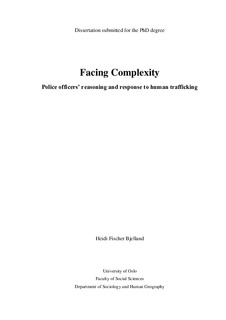| dc.description.abstract | When confronted with complex criminal activities, police officers must deal with situations that do not always fit well with their organization’s regulatory framework and core objectives. While police management tends to stress convictions and the demonstration of police authority as core organizational goals, frontline officers may have other, or additional, understandings of goals and success, which include ones more concerned with the situation and needs of their clients. Nevertheless, the issue of subjective understandings of goals and success among police officers and its implications for their performance has received little attention in the research literature.
This thesis is about how individual members of the police interpret and carry out their work when dealing with complex crimes. As an empirical window into this topic, I explore how police officers and police prosecutors deal with the issue of trafficking in human beings (THB). When handling such crimes, police officers may find that challenges regarding securing and maintaining victim cooperation, or pursuing convictions while also properly safeguarding victims’ wishes and needs, may be a complicating factor. From a sociological perspective, one of the key questions in this context concerns the relation between the expectations of the police organization and how individual police officers understand and perform their work. Employing street-level perspectives and theoretical perspectives from the sociology of organizations, the study seeks to acquire new insights into police responses to complex crime and to understand how individual officers make use of their discretionary power in their work.
The study makes use of a mixed methods design, analysing quantitative and qualitative data. First, by creating a unique data set that brings together information from the Norwegian national crime register and from police case files data, it is possible to demonstrate patterns in local police responses over time. Such analyses would not have been possible using national crime data alone, or surveys, interviews or observational data. Then, to provide a deeper understanding of individual police officers’ reasoning and responses and to make it possible to identify contextual factors, the quantitative analyses are followed by two qualitative studies that further investigate some of the findings of the quantitative analyses.
This produces four articles: one methodological article and three empirical studies. The first article draws upon empirical examples from my own research and demonstrates how more innovative use of police registry data will help capture the complexities of police performance and enable new insights into organizational practices. The second article makes use of data such as that set out in Article I, and explores the role of the police in the construction of THB reports. The third article moves the focus onto the individuals working in the THB field, and explores subjective conceptions of success within police organizations. Finally, the fourth article explores how police officers, as partners in inter-organizational investigations, find strategies to negotiate over organizational boundaries and jurisdictions in order to attain their goals.
Drawing upon an open system model of organizations, the study depicts a dynamic interplay between the top-down and bottom-up processes within the Norwegian police organization. It shows that, because of their discretionary power, frontline workers are able to find creative ways to handle THB. Consequently, they are also able to influence the organizational context in which they operate and to regulate how policy is actually implemented. For instance, thanks to their discretionary power, police officers are able to make strategic choices between legal sanctions in order to attain their goals. The study further indicates that police officers are able to determine whether a case should be defined as a potential THB situation and whether it should be made a police priority. While frontline workers must have autonomy to perform their work within the boundaries of their organization, widespread use of discretion may also threaten the principles of the rule of law and weaken democratic control over the implementation of laws and policies. The study calls attention to potential conflicts between the goals of law enforcement and victim assistance, and argues that reliance on goal-oriented pragmatism may have serious consequences for victims. Finally, the study demonstrates that police officers see multiple ways of achieving success, including convictions, victim awareness, and crime prevention. Most notably, the safety and welfare of victims is seen to be a relevant and meaningful guiding principle that, despite the fact that it produces few visible results to prove organizational productivity, is sometimes set above the more traditional goals of crime management.
The thesis provides important insights into some of the conflicts that the police face when dealing with complex crimes and offers more nuanced understandings of the different ways individual police officers view the issue of success. The study’s findings increase our understanding of the role and importance of professional discretion and of how individual officers make use of their discretionary power when carrying out their work. Seeing how police officers navigate within their environment is key to understanding how they also indirectly construct policy on the ground.
Består av:
Article I: Bjelland, H. F., & Dahl, J. Y. (2017). Exploring Criminal Investigation Practices: The Benefits of Analysing Police-Generated Investigation Data. European Journal of Policing Studies, 5(2), 5-23. Hentet fra http://hdl.handle.net/11250/2452047
Article II: Bjelland, H. F. (2017). Identifying human trafficking in Norway: A register-based study of cases, outcomes and police practices. European Journal of Criminology, 14(5), 522-542. Hentet fra http://hdl.handle.net/11250/2424434
Article III: Bjelland, H. F. (2018). Conceptions of success: Understandings of successful policing of human trafficking. Policing: A Journal of Policy and Practice, 1-14. Hentet fra http://hdl.handle.net/11250/2570344
Article VI: Bjelland, H. F., & Vestby, A. (2017). ‘It’s about using the full sanction catalogue’: on boundary negotiations in a multi-agency organised crime investigation. Policing and Society, 27(6), 655-670. Hentet fra http://hdl.handle.net/11250/2452137 | nb_NO |
